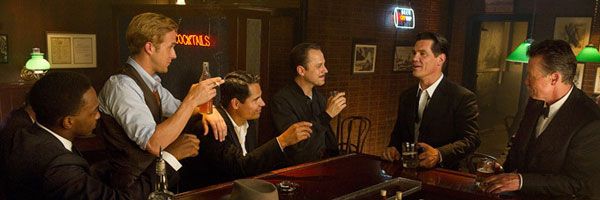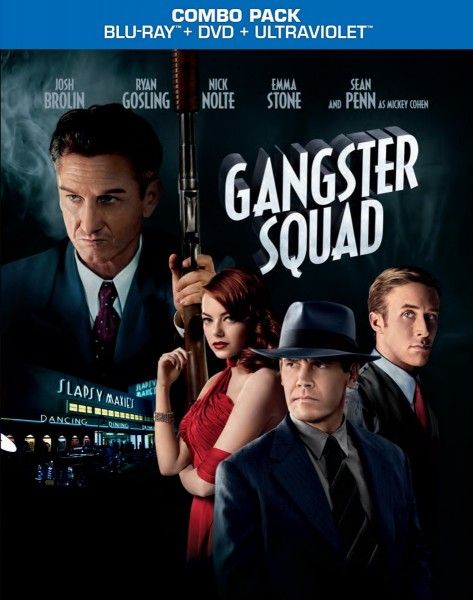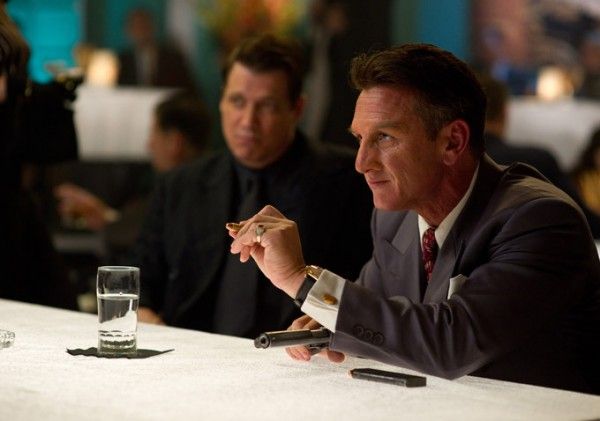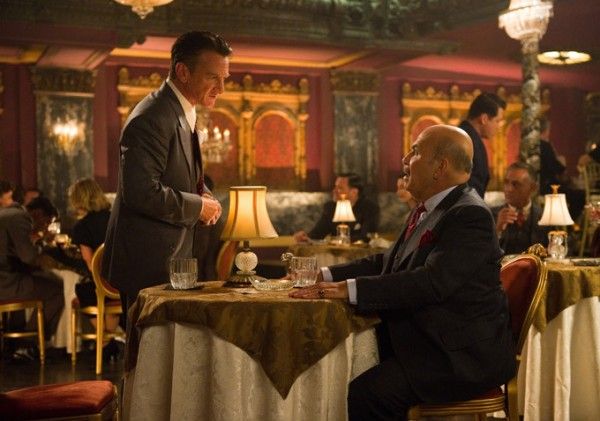Considering that the film was bumped around from September to January due to a national tragedy, it would be nice to feel a little sorry for Ruben Fleischer’s Gangster Squad. The period film, which casts Josh Brolin and Ryan Gosling as cops going against Mickey Cohen (Sean Penn) for control of Los Angeles, has a great cast and period setting. On top of that, The Untouchables is a great film and it wouldn’t be the worst thing to see more films like it. And yet, Gangster Squad is a total miss. My review of the Blu-ray follows after the jump.
Brolin leads as Sgt. John O’Mara, who -- in the opening sequences of the film -- sees a little girl fresh off the bus picked up by a thug who takes her with the hopes of putting her in white slavery. O’Mara’s partner wants none of it, so John storms the building by himself, killing a couple guys in the elevator and then arresting the men about to defile the girl. The action here is over the top, which sets a tone that the film is going to be a violent cartoon, but it never tops the insane sense you get from this opening action sequence. It was Mickey Cohen’s building, so the men O’Mara arrested are released, but Cohen (Penn) kills them anyway, because it’s that kind of movie.
O’Mara’s actions catch the eye of Chief Parker (Nick Nolte) who tasks John with the job of assembling a team to fight Mickey Cohen on a street level. Parker wants him to take down the clubs and organizations Mickey runs to defund him, to cripple him, and make LA a less attractive place for gangsters. O’Mara starts recruiting, and thinks first of Sgt. Jerry Wooters (Gosling), but Jerry’s given up on being a good cop, and has settled in to turning a blind eye towards most things. He’s also sleeping with Grace Faraday (Emma Stone), aka Mickey Cohen’s girlfriend. But when a shooting kills an innocent bystander, Wooters finds his inner cop. Also recruited is Officer Coleman Harris (Anthony Mackie), who hates what heroin has done to his community, old time gunslinger Max Kennard (Robert Patrick) and his current partner Navidad Ramirez (Michael Pena), and whiz-kid Conwell Keeler (Giovanni Ribisi), who knows about wire taps.
Their first raid is a flop (they’re saved at the last minute), but they soon find their rhythm, and realize they have to shut down Cohen’s book as he controls nearly all the gambling on the west coast. But Cohen gets wise to their ways, and so it’s a race against time to shut Cohen down.
The first big noticeable red flag with Gangster Squad is that the film was shot digitally. Much as Michael Mann’s Public Enemies created a disconnect by looking like home video at certain points, the period simply requires film, or at least it does for right now with digital photography still figuring out how to look good with the entire color spectrum. Because of the limitations of the color palate, the film is often bathed in a sickly looking green color, and the powdery look of the film appears more smudgy than sexy. Even Blu-ray does little to compensate for how bad the film looks.
The other is tone. Going completely over the top in a sort of comic book fashion would be good if the whole movie had that pulp energy, but it doesn’t. Instead it comes across as more meat-headed. There’s no sense that you’re watching something ripped from the headlines because nothing feels lived in, which is a shame as screenwriter Will Beall is an ex-detective. It’s strange then that it feels like leftover ideas from other Hollywood movies. It lacks the confidence or narrative strengths of something like L.A. Confidential, nor the sense of hero/warriors that Brian De Palma achieved with The Untouchables. For the most part all the characters are one dimensional at best (for instance, Anthony Mackie’s character is defined by these facts: 1) He’s a cop, 2) he’s black 3) he’s good with a knife. And that’s it). So even with this great of a cast, there’s not much to latch on to, and it makes it look like everyone’s playing dress up. There are good ideas for set pieces, but nothing really pops. Fleischer saves some of his slow motion tricks for the final confrontation, but when it all devolves into a fist fight, everything becomes laughable.
Penn comes across like he knows he’s slumming, which is unfortunate, while the film never digs into the history of Los Angeles. The Gangster Squad must act like terrorists, and have no interest in civil rights. As anyone who knows anything about LA, its police organization has had long standing problems with corruption and racism, but the film never addresses that even though one can see the roots of it in the material. It’s just a bad movie, and though it might have been moved around the calendar because of the shooting in Aurora, it was originally scheduled for September, so it seems likely Warner Brothers knew they had a dog on their hands. But what makes this tragic is that there is a good to great movie in this material, and it will probably never get made.
Warner Brothers presents the film on Blu-ray with a DVD and digital copy. The film is presented widescreen (2.35:1) and in DTS-HD 5.1 master audio. This is a straight digital to digital transfer, so the problems inherent in the digital photography are readily apparent here. The film can be watched in “The Gangland Files” mode where cast and crew talk in pop ups, and branching video goes to little featurettes. Those fifteen “Focus Points” can also be viewed individually and in a play all function (46 min.). The film also comes with a commentary by Ruben Fleischer, which is pretty dull, as Fleuscher is happy with his cast, and loved shooting in Los Angeles. There’s also a short feature that shows the locations as they were in period and how the look now (8 min.), a TV documentary on Mickey Cohen (47 min.), the featurette ‘Tough Guys with Style’ (5 min.) on the look of the film, and seven deleted scenes with an introduction from the director (12 min.). Not included is the original shootout in the movie theater, a sequence that featured in the film’s original trailers, and reshot after the Aurora shooting.




